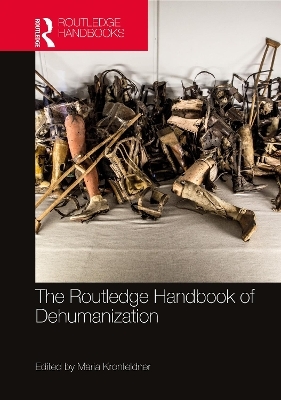
The Routledge Handbook of Dehumanization
Routledge (Verlag)
978-0-367-63713-2 (ISBN)
A striking feature of atrocities, as seen in genocides, civil wars, or violence against certain racial and ethnic groups, is the attempt to dehumanize — to deny and strip human beings of their humanity. Yet the very nature of dehumanization remains relatively poorly understood.
The Routledge Handbook of Dehumanization is the first comprehensive and multidisciplinary reference source on the subject and an outstanding survey of the key concepts, issues, and debates within dehumanization studies. Organized into four parts, the Handbook covers the following topics:
The history of dehumanization from Greek Antiquity to the 20th century, contextualizing the oscillating boundaries, dimensions, and hierarchies of humanity in the history of the ‘West’;
How dehumanization is contemporarily studied with respect to special contexts: as part of social psychology, as part of legal studies or literary studies, and how it connects to the idea of human rights, disability and eugenics, the question of animals, and the issue of moral standing;
How to tackle its complex facets, with respect to the perpetrator’s and the target’s perspective, metadehumanization and selfdehumanization, rehumanization, social death, status and interdependence, as well as the fear we show toward robots that become too human for us;
Conceptual and epistemological questions on how to distinguish different forms of dehumanization and neighboring phenomena, on why dehumanization appears so paradoxical, and on its connection to hatred, essentialism, and perception.
Essential reading for students and researchers in philosophy, history, psychology, and anthropology, this Handbook will also be of interest to those in related disciplines, such as politics, international relations, criminology, legal studies, literary studies, gender studies, disability studies, or race and ethnic studies, as well as readers from social work, political activism, and public policy.
Maria Kronfeldner is Professor of Philosophy at Central European University (New York - Vienna - Budapest). She is the author of What’s Left of Human Nature (2018), and Darwinian Creativity and Memetics (Routledge, 2011). She currently directs 'The Epistemology of the In/Human' project.
1. Introduction: Mapping dehumanization studies Maria Kronfeldner Part 1: Oscillating boundaries, dimensions, and hierarchies of humanity in historical contexts 2. Dehumanization Before the Columbian exchange Siep Stuurman 3. "Humanity" and its Limits in Early Modern European Thought László Kontler 4. Enlightenment Humanization and Dehumanization, and the Orang-utan Silvia Sebastiani 5. Dehumanizing the Exotic in Living Human Exhibitions Guido Abbattista 6. Dehumanizing Strategies in Nazi Ideology and their Anthropological Context Johannes Steizinger 7. Theorizing the Inhumanity of Human Nature, 1955-1985 Erika Lorraine Milam Part 2: Further special contexts of dehumanization 8. The Social Psychology of Dehumanization Nick Haslam 9. Dehumanization and the Loss of Moral Standing Edouard Machery 10. Dehumanization and the Question of Animals Alice Crary 11. Dehumanization, Disability, and Eugenics Robert A. Wilson 12. Dehumanization and Human Rights Marie-Luisa Frick 13. Dehumanization by Law Luigi Corrias 14. Dehumanisation in Literature and the Figure of the Perpetrator Andrea Timár Part 3: The complex facets of dehumanization 15. Dehumanization and Social Death as Fundamentals of Racism Wulf D. Hund 16. How Status and Interdependence Explain Different Forms of Dehumanization Susan T. Fiske 17. Exploring Metadehumanization and Self-dehumanization from a Target Perspective Stéphanie Demoulin, Pierre Maurage, and Florence Stinglhamber 18. The Dehumanization and Rehumanization of Refugees Victoria M. Esses, Stelian Medianu, and Alina Sutter 19. Motivational and Cognitive Underpinnings of Fear of Social Robots that become "Too Human for Us" Maria Paola Paladino, Jeroen Vaes, and Jolanda Jetten Part 4: Conceptual and epistemological questions regarding dehumanization 20. Objectification, Inferiorization, and Projection in Phenomenological Research on Dehumanization Sara Heinämaa and James Jardine 21. Why Dehumanization is Distinct from Objectification Mari Mikkola 22. On Hatred and Dehumanization Thomas Brudholm and Johannes Lang 23. Dehumanization, the Problem of Humanity and the Problem of Monstrosity David Livingstone Smith 24. Psychological Essentialism and Dehumanization Maria Kronfeldner 25. Could Dehumanization Be Perceptual? Somogy Varga. Index
| Erscheinungsdatum | 11.07.2023 |
|---|---|
| Reihe/Serie | Routledge Handbooks in Philosophy |
| Zusatzinfo | 3 Tables, black and white; 4 Line drawings, black and white; 5 Halftones, black and white; 9 Illustrations, black and white |
| Verlagsort | London |
| Sprache | englisch |
| Maße | 174 x 246 mm |
| Gewicht | 780 g |
| Themenwelt | Geisteswissenschaften ► Philosophie ► Erkenntnistheorie / Wissenschaftstheorie |
| Geisteswissenschaften ► Philosophie ► Ethik | |
| Geisteswissenschaften ► Psychologie ► Allgemeine Psychologie | |
| Sozialwissenschaften ► Soziologie ► Spezielle Soziologien | |
| ISBN-10 | 0-367-63713-8 / 0367637138 |
| ISBN-13 | 978-0-367-63713-2 / 9780367637132 |
| Zustand | Neuware |
| Haben Sie eine Frage zum Produkt? |
aus dem Bereich

![Was heißt Denken?. Vorlesung Wintersemester 1951/52. [Was bedeutet das alles?] - Martin Heidegger](/media/113619842)
